In spite of director John Doyle (and thanks to Raúl Esparza), Stephen Sondheim’s musical of vignettes, Company, has made a triumphant return to Broadway. From the set to the lighting, the show has everything going for it except Doyle's gimmick of doubling actors as musicians. Whereas Sweeny Todd forced Doyle to come up with creative combinations of character and instrument, Company rarely uses its entire cast at once, which renders the effect more an economic sidebar than a relevant or fresh medley... But beyond that first step--and it may be a doozy--Company is a triumph and Esparza is due a Tony for his commanding work as Robert, top dog of the glowing thirteen person ensemble one moment, depressed romantic the next.Read on at [New Theater Corps]
11.29.2006
THEATER - "Company"
11.28.2006
BRIEF: "Evil Dead" and "The Internationalist"
The Internationalist is closed now, again, and with it goes another opportunity to see a talented ensemble cast outperforming the flaws of its script. We aren't supposed to understand what the characters in this ficticious foreign country are saying, but the inability to comprehend our visiting American protagonist's Lost in Translation plot makes Anne Washburn's script like a thin and gauzy dance of the seven veils: both translucent and opaque, both seductive and frustrating, it's hard to pass judgement on. I will say that the set design--a Morrocan stucco of sorts, recessed far enough back in the stage that a portable office can sit in the center--did not sit well with me, reducing the show more to an art piece than a comedy. The lighting managed to balance some of the notes and tones lost in the rest of the production, as did the superb and crisp acting of the cast, but the conclusion left me both in search of the punchline and the punch.
MUSIC - Roman Candle, "The Wee Hours Review"
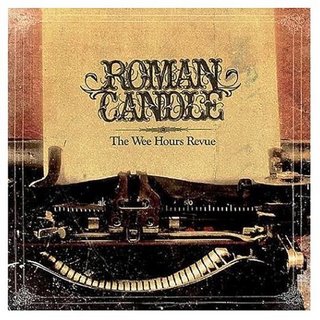 Too brash for country, too acoustic for rock, and too poetic for pop, Roman Candle is a perfect fit for the firework it is named for. There's a mellow outer shell, occasionally amplified by synthesizers (but never lost in them) but Skip Matheny's crooning is just casing for the subtle mechanics underneath. Words that slide within one another like gloves, twang-heavy chords that shuffle off the drum beats, and a powerful storytelling rhythm that should propel this vibrant musical explosion to the top of the charts.
Too brash for country, too acoustic for rock, and too poetic for pop, Roman Candle is a perfect fit for the firework it is named for. There's a mellow outer shell, occasionally amplified by synthesizers (but never lost in them) but Skip Matheny's crooning is just casing for the subtle mechanics underneath. Words that slide within one another like gloves, twang-heavy chords that shuffle off the drum beats, and a powerful storytelling rhythm that should propel this vibrant musical explosion to the top of the charts. Read on at [Silent Uproar]
11.22.2006
FILM - "Perfume"
 How did a 1985 German gothic horror novel gain attention enough to warrant a film? That story, one which would reveal how German auteur Tom Twyker (of Run Lola Run) got involved, would be more interesting than the overly stylized urban fantasy that is Perfume: The Story of a Murderer. Strictly as a period piece, Twyker gets some great shots of the good, bad, and ugly Renaissance France, but it is plagued by an inability to make us relate to anyone in the film, be it the vengeful father Richis (Alan Rickman), the doltish perfumer Baldini (Dustin Hoffman), or even our misunderstood serial killer, Jean-Baptiste Grenouille (Ben Whishaw). (Then again, it’s hard to say “misunderstood”—he kills at least thirteen women in an effort to create a god-like perfume.)
How did a 1985 German gothic horror novel gain attention enough to warrant a film? That story, one which would reveal how German auteur Tom Twyker (of Run Lola Run) got involved, would be more interesting than the overly stylized urban fantasy that is Perfume: The Story of a Murderer. Strictly as a period piece, Twyker gets some great shots of the good, bad, and ugly Renaissance France, but it is plagued by an inability to make us relate to anyone in the film, be it the vengeful father Richis (Alan Rickman), the doltish perfumer Baldini (Dustin Hoffman), or even our misunderstood serial killer, Jean-Baptiste Grenouille (Ben Whishaw). (Then again, it’s hard to say “misunderstood”—he kills at least thirteen women in an effort to create a god-like perfume.)Read on at [Film Monthly]
FILM - "The Fountain"
 You should know that I really wanted The Fountain to be good. Aronofsky’s previous two films, Pi and Requiem for a Dream, were what got me interested in cinema in the first place. And while Aronofsky still knows how to handle the camera, it seems like he’s lost control of what to actually film. His “epic” is a triptych spanning the lives of two lovers in the years 1500, 2000, and 2500. The jungle adventures of a Spanish conquistador looking for the Tree of Life atop an ancient Mayan temple could well have been directed by a lesser-budgeted Peter Jackson (lush, but without scope). The modern sequences of a doctor trying to find a cure for his wife’s brain tumor—it might as well be Sam Mendes filming, with his simple observations of life, love, and loss. And as for the future scenario, Kubrick is written all over it, from the silent and meditative sequences, to its ambiguous (though not as prolonged) visual landscaping. The only thing that’s pure Aronofsky is the beautiful editing, the bleeding of one time to another, and that’s just eye candy to distract from the all-too-confusing plot.
You should know that I really wanted The Fountain to be good. Aronofsky’s previous two films, Pi and Requiem for a Dream, were what got me interested in cinema in the first place. And while Aronofsky still knows how to handle the camera, it seems like he’s lost control of what to actually film. His “epic” is a triptych spanning the lives of two lovers in the years 1500, 2000, and 2500. The jungle adventures of a Spanish conquistador looking for the Tree of Life atop an ancient Mayan temple could well have been directed by a lesser-budgeted Peter Jackson (lush, but without scope). The modern sequences of a doctor trying to find a cure for his wife’s brain tumor—it might as well be Sam Mendes filming, with his simple observations of life, love, and loss. And as for the future scenario, Kubrick is written all over it, from the silent and meditative sequences, to its ambiguous (though not as prolonged) visual landscaping. The only thing that’s pure Aronofsky is the beautiful editing, the bleeding of one time to another, and that’s just eye candy to distract from the all-too-confusing plot. Read on at [Film Monthly]
11.20.2006
THEATER - "Home Front"
Yes, Home Front is a play about post-traumatic stress syndrome, and yes, it is a partially modernized version of Euripides's’ classic Greek drama, Herakles. But Daniel Algie's choice to set the show in 1972 makes the work both dated and formulaic, as out-of-touch with today as Herakles itself. Why set up one parallel to make another parallel? It seems that Algie just likes the road most traveled: his tragedy is tame and predictable, and his characters are the same.
Meg has spent the last seven years in and out of an insane asylum, too busy grieving for her MIA husband to care for her children. Fact. Her lonely father-in-law, Arthur, resents her for it, though he loves caring for his grandkids. Fact. (But we'll have to take the script's word for it -- Joseph Jamrog is so dispassionate as Arthur that he appears to be sleepwalking.) These two elements of the play are completely ignored in the second act. Fact. Heck, the only consistent thing is the scattered exposition, and while at least Fletcher McTaggert's delivery as the ex-MIA husband isn't bad, he's still delivering unflinchingly dull confessions. With such weak characters, there's no way to avoid listening to the dishpan dialogue: "This too shall pass. You're a tough old bird." I don't know if people once spoke like this, but doesn't the playwright have a license--no, a duty--to make it sound better?
As for E. Randahl Hoey's direction, save for an invigorating dream sequence early on in the first act that shows the promise of a more metaphorical play, the action is thick as cement, and about as exciting. There'’s so little happening that after chomping at the bit for two hours, the actors go overboard when the big moment hits, only to find that the play keeps going for another fifteen aimless minutes, just one more disconnected scene.
Home Front doesn'’t bring up any big questions; that's good, it doesn't seem capable of answering any. Instead, the play is a confessional: each character gets a lengthy monologue to encompass their sins. Arthur reveals that he's not actually
11.19.2006
THEATER - "An Oak Tree"
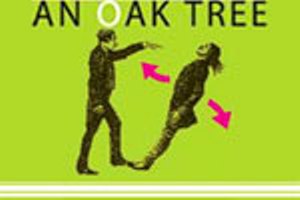 An Oak Tree is Gimmick Theater at it's not-so-finest. However, it's bankable cast makes it viable: every night, a new actor who has never read the script or seen the show will join Tim Crouch (who plays a hypnotist) for this two-hander. The play, written by Crouch, is an interesting short story that uses the metaphor and the mechanics of hypnotism to deal with the grief of memory. The actor plays the father of a little girl that Crouch's hypnotist has killed, a man so distraught by the accident that he's convinced he's turned his daughter into an oak tree. The delusion is well served by the poetic lines, but delivered cold by an actor who is coming to terms with the role piecemeal, it's more controlled and uneven than gripping. Maja Wampusyc, the actor for the 11/18 performance, may have been hypnotized: I, however, was not.
An Oak Tree is Gimmick Theater at it's not-so-finest. However, it's bankable cast makes it viable: every night, a new actor who has never read the script or seen the show will join Tim Crouch (who plays a hypnotist) for this two-hander. The play, written by Crouch, is an interesting short story that uses the metaphor and the mechanics of hypnotism to deal with the grief of memory. The actor plays the father of a little girl that Crouch's hypnotist has killed, a man so distraught by the accident that he's convinced he's turned his daughter into an oak tree. The delusion is well served by the poetic lines, but delivered cold by an actor who is coming to terms with the role piecemeal, it's more controlled and uneven than gripping. Maja Wampusyc, the actor for the 11/18 performance, may have been hypnotized: I, however, was not.Read on at [New Theater Corps]
11.15.2006
MUSIC - Pony Up!, "Make Love to the Judges With Your Eyes"
 Pony Up is a reduced, all-female version of The Arcade Fire: a cheery bunch, trapped in the slow cadences of their French Canadian roots, and their CD, Make Love to the Judges with Your Eyes is a trivial, repetitious attempt to be poignant: the guy in the room who always brings cheap flowers on a date. The musical choice to add a lo-fi, tinkertoy of a keyboard to the all-too familiar drums ‘n guitars is annoying, not pleasant, and they don’t take the hint: the whole album is a slow-moving variation on the same bad idea. That, by the way, doesn’t make them hopeless romantics—it just makes them bland.
Pony Up is a reduced, all-female version of The Arcade Fire: a cheery bunch, trapped in the slow cadences of their French Canadian roots, and their CD, Make Love to the Judges with Your Eyes is a trivial, repetitious attempt to be poignant: the guy in the room who always brings cheap flowers on a date. The musical choice to add a lo-fi, tinkertoy of a keyboard to the all-too familiar drums ‘n guitars is annoying, not pleasant, and they don’t take the hint: the whole album is a slow-moving variation on the same bad idea. That, by the way, doesn’t make them hopeless romantics—it just makes them bland.Read on at [Silent Uproar]
11.14.2006
THEATER - "How to Save the World and Find True Love in 90 Minutes"
When a musical manages to live up to its title and nothing else, you know there's a problem. The one true thing about How to Save the World and Find True Love in 90 Minutes is that it's 90 minutes. That the creators, Jonathan Karp and Seth Weinstein, make fun of this in the program or that they'd call this an homage to Frank Loesser just shows how lost they are with this post-Fringe (but barely) show. Lately, there's been a little too much camp in the musical theater, especially at New World Stages (though Evil Dead justifies itself through a built-in fan base, a more stylized score, and far more talented performers), and How to Save the World... never manages to rise above its premise. The show's also incredibly dated, relying so heavily on current events for cheap jokes (Madonna's baby, the South Beach diet, &c.) that there's never any build, just a never-ending stream of superficiality. (Okay, some of it--like the insulting description of a "neo-feminist Buddhist Henry Higgins"--is a guilty pleasure. And there are a few moments of wit: "Everybody I know is a disgruntled employee. You ever hear of a gruntled employee?")
Save for those few spots of color, this is an otherwise monotone paint-by-numbers musical. Our shy and reluctant hero Miles Muldoon (Michael McEachran) gets a unique chance to get the girl he wants, only to find that he's really in love with his best friend. To distinguish this from the others just like it, Karp digs deep into a random pool of happenstance and decides that Miles will become telepathic. But telepathic by means of a freak accident...like, say, getting conked on the head by a flying melon. But not just any melon: a melon thrown by an angry Guatemalan farmer. Follow that logic a little further and it's only inevitable that Miles is beaned by fruit because he's trying to impress the girl of his dreams with his diplomatic prowess. (At this point, it should be noted that the show takes place in the UN.)
Assuming that Miles's ability to read minds can only lead to hilarity, Karp comes up with a grammatical twist, and tweaks the plot so that Miles's diplomatic crush, Violet Zipper (Nicole Ruth Snelson) turns out to be dating a terrorist who, for anonymity, she refers to as He. Hence the thought "I love it when He looks at me like that," only encourages Miles, and by the time he realizes there's a plot to infect the UN with a nausea-inducing virus, he's only got ten minutes left for a climactic showdown. (It should be mentioned that Mr. McEachran doubles as "He," an obvious device that sets up a gut-bustingly funny fight scene -- director Christopher Gattelli doesn't have much to work with, but at least he nails this part.)
Got your checklist out? There are meta jokes about a power ballad sung by the delightful Anika Larson (as the best-friend-who-saves-the-day, Julie Lemmon), random appearances by manic characters like a yogi, a gay therapist, and, of course, Condoleeza Rice, and, for some reason, a Greek chorus (who double as those three characters). How To Save the World is so strung out, it might as well be a junkie--it certainly isn't any good while sober.
11.12.2006
THEATER - "Beckett Below"
 The problem with Samuel Beckett’s short plays is the same one you’ll find with his longer plays – for all the bleakly hopeful lyricism, it’s more often confusing than delightful. If you really go to the theater for existential minimalism and enjoy theatrical devices over theater itself, Beckett’s tightly wrapped plays will delight you; otherwise, there’s not much to do but appreciate the scenery and the craft. Disclaiming aside, the theater company known as ghostcrab has decided to carry on (I can’t go on, I’ll go on) with a compilation of four short Beckett plays. Performed in a small underground theater that gets too stuffy for comfort, the evening is titled Beckett Below, and consists of “Play,” “Act Without Words II,” “Footfalls,” and “That Time,” each showcasing a different director and set of actors. The result is a visually striking enterprise that slathers on a great deal of respect for Beckett while attempting to convert its audience.
The problem with Samuel Beckett’s short plays is the same one you’ll find with his longer plays – for all the bleakly hopeful lyricism, it’s more often confusing than delightful. If you really go to the theater for existential minimalism and enjoy theatrical devices over theater itself, Beckett’s tightly wrapped plays will delight you; otherwise, there’s not much to do but appreciate the scenery and the craft. Disclaiming aside, the theater company known as ghostcrab has decided to carry on (I can’t go on, I’ll go on) with a compilation of four short Beckett plays. Performed in a small underground theater that gets too stuffy for comfort, the evening is titled Beckett Below, and consists of “Play,” “Act Without Words II,” “Footfalls,” and “That Time,” each showcasing a different director and set of actors. The result is a visually striking enterprise that slathers on a great deal of respect for Beckett while attempting to convert its audience. Read on at [New Theater Corps]
11.11.2006
MUSIC - Guster, "Ganging Up On the Sun"
 Guster’s latest album, Ganging Up on the Sun is an amalgam of standard rock, clean-cut alternative beats, and up-tempo full-band medleys. It’s also an escape from the deadly “pop” moniker—these songs have bounce, particularly the delightful banjo-driven “The Captain,” and they’re slick, as with the perfectly produced and synthesized “Satellite,” but the whole album is far more alternative or straight-up rock than past releases. Part of this is due to the new member, Joe Pisapia, who adds that country-modern flair. For all that, this is still the same group that started as Gus back at Tufts: just listen to a song like “Hang On” and it’s 2003 all over again. Brian’s still playing the drums with his hands, tracks like “Ruby Falls” keep the same delightful falsetto, and the songs are still cozy, natural, and playful.
Guster’s latest album, Ganging Up on the Sun is an amalgam of standard rock, clean-cut alternative beats, and up-tempo full-band medleys. It’s also an escape from the deadly “pop” moniker—these songs have bounce, particularly the delightful banjo-driven “The Captain,” and they’re slick, as with the perfectly produced and synthesized “Satellite,” but the whole album is far more alternative or straight-up rock than past releases. Part of this is due to the new member, Joe Pisapia, who adds that country-modern flair. For all that, this is still the same group that started as Gus back at Tufts: just listen to a song like “Hang On” and it’s 2003 all over again. Brian’s still playing the drums with his hands, tracks like “Ruby Falls” keep the same delightful falsetto, and the songs are still cozy, natural, and playful.11.09.2006
THEATER - "Stanley (2006)"
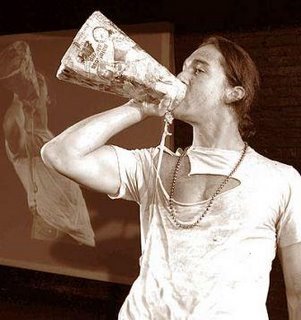 Stanley (2006), arguably the most accomplished theatrical event of the Off-Broadway season, begins by revisiting the seminal Stanley Kowalski (by way of Brando), and ends with a man drowning under the weight of a life wrecked beyond repair. This one-man show, conceived by the D’Amour siblings Lisa (writer/director) and Todd (actor), is a highly physical, often frantic story, which focuses on a man who believes he's Kowalski from A Streetcar Named Desire, and as such roams the streets of modern-day America in search of Blanche Dubois.
Stanley (2006), arguably the most accomplished theatrical event of the Off-Broadway season, begins by revisiting the seminal Stanley Kowalski (by way of Brando), and ends with a man drowning under the weight of a life wrecked beyond repair. This one-man show, conceived by the D’Amour siblings Lisa (writer/director) and Todd (actor), is a highly physical, often frantic story, which focuses on a man who believes he's Kowalski from A Streetcar Named Desire, and as such roams the streets of modern-day America in search of Blanche Dubois.Read on at [Show Business Weekly]
11.08.2006
THEATER - "The Sneeze"
If a spoonful of sugar helps the medicine go down, what happens when you replace the spoonful with two glasses, and the sugar with liquor? Not that The Sneeze, a translation of Anton Chekhov’s early comic work by the talented Michael Frayn, is medicine—it’s more like ambrosia or manna, palatable as it is. Presented as part of Phoenix Theater Ensemble’s Play in a Pub series, The Sneeze is an intimate, lively bit of comedy. The theme connecting its six short scenes is a little unsteady—a wandering Russian trio walks into a bar (insert joke here)—and it isn’t served by the intermission (the break is more social than theatrical), but hey, have a drink. Stay a while.Read on at [New Theater Corps]
11.05.2006
THEATER - "The Thugs"
Adam Bock's The Thugs is dark comedy à la Seinfeld — a play about the sort of nothing that can reach out and bite you on the ass. The play centers on seven lifelong paralegal temps who are rife with behavioral tics after countless days of sitting under the throbbing glow of overhead light strips and listening to the hum of electric static. Their loss — time spent sniffing rainbow-colored highlighters and fighting over the electric pencil sharpener — is our gain. Even in the play's forcefully underdramatic moments, these quirky characters capture our rapt attention.Read on at [Show Business Weekly]
11.04.2006
THEATER - "The Imaginary Invalid" and "The Mail Order Bride"
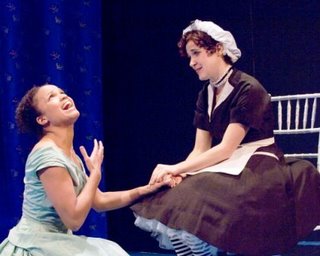 Patterson’s adaptation is satisfying, if only because there’s a dearth of Molière right now. Her all-female cast, gimmick or no, does well (particularly Virginia Baeta and Amy Driesler), but it adds nothing to the show, and while the addition of musical interludes manages to compress whole acts into minutes, did we need the cheesy lip synching to Tina Turner’s “Simply the Best” or Cher’s “Gypsies, Tramps & Thieves”? Luckily, the show’s maintained the classic stock characters, and Carey Urban steals every scene she’s in (as a good Columbina should). Jenny Fulton’s costumes help to immediately establish character (great for actors playing dual roles), but then again, why doesn’t anybody wear shoes? Which doctor told the great hypochondriac Argan to do that? Despite this director’s meddling, Molière shines through the dull translation, and the performances carry the day.
Patterson’s adaptation is satisfying, if only because there’s a dearth of Molière right now. Her all-female cast, gimmick or no, does well (particularly Virginia Baeta and Amy Driesler), but it adds nothing to the show, and while the addition of musical interludes manages to compress whole acts into minutes, did we need the cheesy lip synching to Tina Turner’s “Simply the Best” or Cher’s “Gypsies, Tramps & Thieves”? Luckily, the show’s maintained the classic stock characters, and Carey Urban steals every scene she’s in (as a good Columbina should). Jenny Fulton’s costumes help to immediately establish character (great for actors playing dual roles), but then again, why doesn’t anybody wear shoes? Which doctor told the great hypochondriac Argan to do that? Despite this director’s meddling, Molière shines through the dull translation, and the performances carry the day. 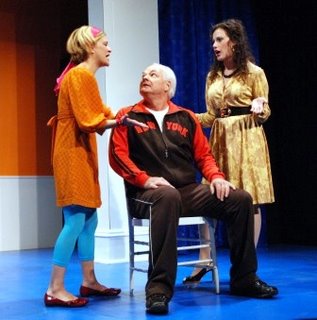 A little Molière goes a long way, but for Charles L. Mee, not far enough. His production, shruggingly directed by Eric Parness, tries character after character to make something happen, but it’s not funny, and it’s not clever. (It’s a Chekhovian comedy—more tragic than funny.) Our show opens with Argan (John Henry Cox) working out at the behest of his two lesbian (why not?) trainers (Vivia Font and Lori McNally). This Argan isn’t sick: why, he’s just purchased a nice Asian mail-order bride named June (Sue Jean Kim). Pulling more from Tartuffe and School for Wives, Mee quickly reveals that June is in love with another man and then, as if out of ideas, decides to have June’s lover, Horner, sing about being a castrato, and then to have June get a bull-dyke makeover which involves her rapping and swinging around a nunchaku while in combat boots. Sure, whatever. Considering how rich even the subplot of The Imaginary Invalid is, it’s amazing that this play, which is all lackluster subplot, got produced.
A little Molière goes a long way, but for Charles L. Mee, not far enough. His production, shruggingly directed by Eric Parness, tries character after character to make something happen, but it’s not funny, and it’s not clever. (It’s a Chekhovian comedy—more tragic than funny.) Our show opens with Argan (John Henry Cox) working out at the behest of his two lesbian (why not?) trainers (Vivia Font and Lori McNally). This Argan isn’t sick: why, he’s just purchased a nice Asian mail-order bride named June (Sue Jean Kim). Pulling more from Tartuffe and School for Wives, Mee quickly reveals that June is in love with another man and then, as if out of ideas, decides to have June’s lover, Horner, sing about being a castrato, and then to have June get a bull-dyke makeover which involves her rapping and swinging around a nunchaku while in combat boots. Sure, whatever. Considering how rich even the subplot of The Imaginary Invalid is, it’s amazing that this play, which is all lackluster subplot, got produced. If this play has a saving grace—a big if—it’s the actors playing the two squabbling daughters, Melissa Miller and Susan Louise O’Connor. These two manage to look like they enjoy being in this show and even show some depth. Some actors, like Jarel Davidow, have less time to establish themselves, but that’s hardly an excuse. (Booth Daniels manages to give his nerdy Cleante a little character.) Suffice to say that after enduring Horner’s awful song about being a castrato and watching the cast shuffle around to the canned music of a bad high school show, it’s hard to take pleasure in even the good parts of Mee’s work.
Molière wrote his play to be a polemic against the then-foolish medical profession. The Mail Order Bride is either the sort of kooky, half-cooked idea that one of these doctors would have come up with or an unintentionally successful cure for the common laugh: you won’t be chuckling. Bottom line: this isn’t Molière. The Imaginary Invalid is at least a passable romp, with lively, energetic actors, but it lacks the subtlety and the build of the unabridged, rhyming version: so please, don’t fix what ain’t broken.
11.02.2006
FILM - "Saw III"
 This new Jigsaw is a real bitch. Literally. In Saw III, Amanda (Shawnee Smith), once a victim herself, has taken up the gruesome, game-playing mantle of Jigsaw, creating clever contraptions that test a person’s will to live through pain and suffering. But Amanda isn’t interested in the old Jigsaw’s (Tobin Bell) tests: in her world, just because you plunge your hand into a vat of acid so that you can unlock the harness that’s seconds away from ripping your spinal cord apart . . . that doesn’t mean you should live. And should you manage to rip all the thick ringlets out of your skin before the bomb in the room explodes, you’ll find that the door has been soldered shut. Sucks to be you.
This new Jigsaw is a real bitch. Literally. In Saw III, Amanda (Shawnee Smith), once a victim herself, has taken up the gruesome, game-playing mantle of Jigsaw, creating clever contraptions that test a person’s will to live through pain and suffering. But Amanda isn’t interested in the old Jigsaw’s (Tobin Bell) tests: in her world, just because you plunge your hand into a vat of acid so that you can unlock the harness that’s seconds away from ripping your spinal cord apart . . . that doesn’t mean you should live. And should you manage to rip all the thick ringlets out of your skin before the bomb in the room explodes, you’ll find that the door has been soldered shut. Sucks to be you. After these establishing deaths (horror “street cred,” as it were), Saw III focuses on what makes a person work for the man who placed a reverse bear trap in their mouth and the key to its lock in the stomach of a drugged but otherwise very much alive person. A series of flashbacks (that include former cast members Leigh Whannell and Donnie Wahlberg) give closure to all the storylines and set up one final test. Luckily for us (and unluckily for everyone else), John is still alive, and this last game, played from his deathbed, is a killer. Fans—you won’t be disappointed. Saw III is as sick as it is slick.
Read on at [Film Monthly]